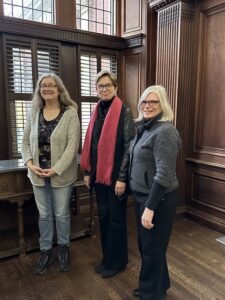A new project from the Regis St. Michael’s Faculty of Theology (RSM) will offer educators the tools needed to help adolescents deal with the growing challenge of climate anxiety.
Climate anxiety – also known by such terms as eco-anxiety, climate grief, or climate trauma – refers to the negative impact climate change can have on mental health. Numerous surveys indicate the experience of worries and fears for the future brought on by climate change is growing and is particularly intense among adolescents and young adults.

Now, RSM Professors Hilda Koster and Cynthia Cameron are launching Critical Conversations in Catholic Education: Climate Change and Eco-Social Resilience, a series of free workshops and a conference designed to engage educators in a conversation about how best to support adolescents and young adults in the face of a rapidly changing world.
“Young people are caught in a moment of feeling overwhelmed, and feeling hopelessness in the face of it all,” says Koster, who is an Associate Professor of Eco-Theology and the Director of the Elliott Allen Institute for Theology and Ecology. She also holds the Sisters of St. Joseph of Toronto Chair in Theology at RSM.
Climate anxiety “is a spiritual problem, and not just a problem of morals. It’s an existential issue,” she says, noting that the syndrome can result in apathy, isolation, and depression. “It’s hard to feel connected when you are anxious.”
Koster notes that while many Catholic schools now include Laudato Si’, Pope Francis’s groundbreaking encyclical on the environment, in their curriculum, there is a new but growing body of research and literature on climate anxiety that teachers may not be aware of yet. The two professors plan to draw on familiar spiritual resources such as Laudato Si’ (also referred to ‘On care for our common home’), which was promulgated in 2015, while also introducing newer materials specifically addressing climate anxiety.
“We want to help school boards and teachers connect the dots between the ecological, religious, and mental health aspects of this issue,” says Cameron, who is Assistant Professor of Catholic Education at RSM and holds the Patrick and Barbara Keenan Chair in Religious Education. Everyone working in a Catholic school is a religious educator, she notes, and so findings ways to help students develop resilience in the face of climate anxiety touches everyone from the chaplain to English, science and health teachers, for example, through to administrative staff.
The project is designed primarily to address issues emerging in the Grs. 7-12 range, with particular emphasis on the high school years, Cameron explains, noting there is a “confluence of anxiety and depression that begins to increase around the age of 11 or 12.”
While the Critical Conversations workshops will be presented through a Catholic lens, many of the lessons learned will be applicable to all students regardless of faith tradition, she adds.
Doctoral candidate Rosemary Boissonneau, who is also working on Critical Conversations, sees the project being particularly helpful to new teachers. While not the target age of the project, many young teachers are also facing their own climate fears, she says, questioning, for example, the risks their own children may face if climate change is not controlled. These personal worries come as they work with students who are extremely stressed by the topic – one of the factors that can lead to teacher burnout, says Boissonneau, a teacher herself.
The first workshop will be led by Cameron and Koster, focussing on the topic of “Climate Anxiety, Education, and Catholic Social Teaching” In addition, there will be a presentation by teacher and alumna Gabrielle Chan on her research for her Master of Theological Studies thesis on “Laudato Si’, Climate Anxiety and Youth.” Boissonneau will speak on her work as an educator, climate activist with “Fridays for Future” and “The Laudato Si’ Movement,” and a biblical scholar.
This workshop is co-sponsored by the Halton Catholic District School Board and the Dufferin-Peel Catholic District School Board and takes place on Wednesday, February 21 from 4:30-6 pm at St. Francis Xavier Secondary School, 1145 Bronte Street South, Milton, with an online option available.
The second workshop, “Science, Suffering, and Eco-Theology,” will be held on Wednesday, April 17, will include a presentation by Prof. Adam Hincks, S.J., who is Assistant Professor and the Sutton Family Chair in Science, Christianity and Cultures at St. Michael’s. He will be joined by RSM’s Prof. J.P. Fortin, who is Associate Professor of Practical Theology, and doctoral student Deanna Zantingh, whose research area focuses on Indigenous youth suicide and environmental devastation. Sr. Mary Anne Francalanza, fcJ, a science teacher who is working toward a diploma in Theology and Ecology will also be speaking. This second workshop is sponsored by the Durham Catholic District School Board at its Pope Francis Conference Centre, at 652 Rossland Rd. W. in Oshawa. This event will also be offered online.
While the workshops are designed primarily for teachers, the concluding day-long conference will have a broader audience, including students from the Toronto School of Theology and various faculties and departments at the University of Toronto. Youth, Climate Anxiety and Religious Education, which takes place on Saturday, Oct. 5 on campus, will feature Prof. Joyce Mercer, a professor of practical theology and pastoral care at the Yale Divinity School who has written on the topic of children and climate anxiety.
Along with a keynote address, the conference will include panel discussions, opportunities for networking, and tables of information.
“This project is a two-way street,” says Koster, who says that she and Cameron look forward to listening to and learning from the experiences of teachers working with adolescents to further their own work.
The Critical Conversations project is being funded by a Moving Forward in Mission grant from the Association of Theological Schools, RSM’s accrediting body. The professors note that the grant’s stated purpose reflects RSM’s commitment to serve the broader community, offering educational outreach to answer critical issues of the day.
